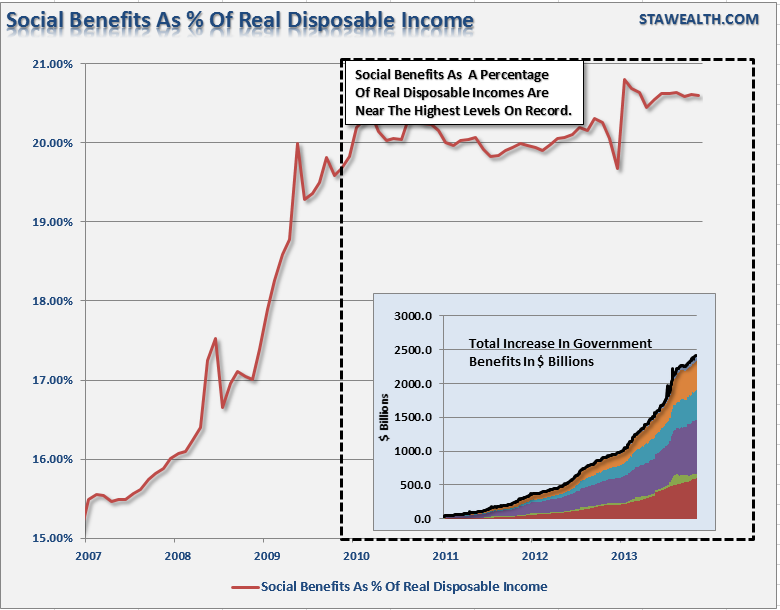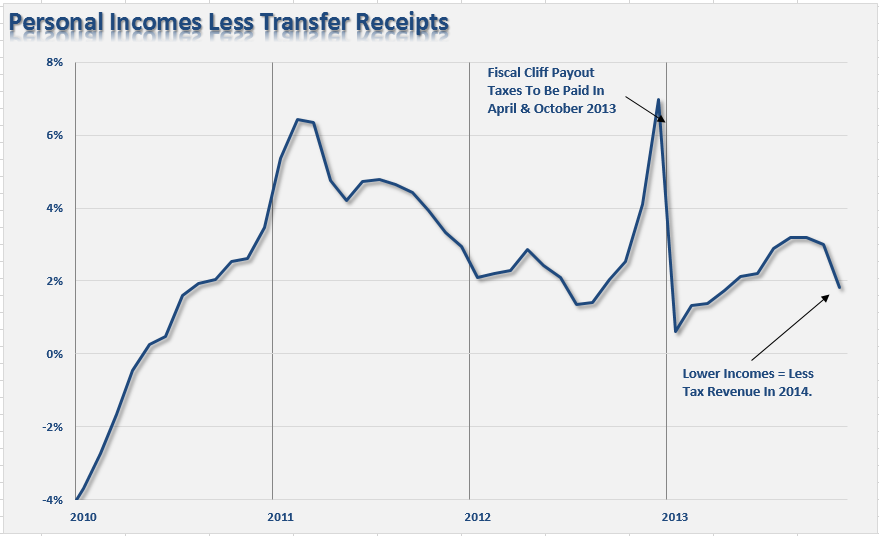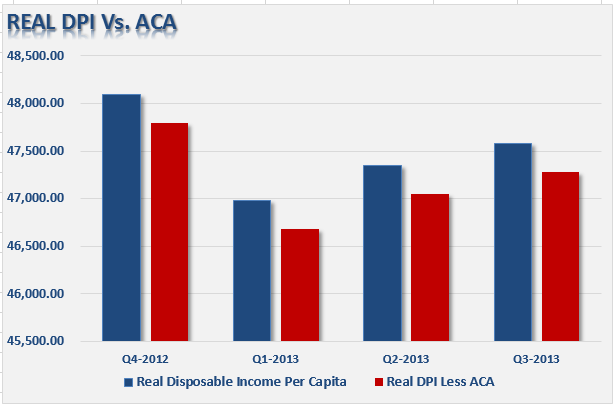I have had the distinct pleasure of visiting with Paul La Monica a couple of times during my visits to the "Big Apple" and have always made sure to read his writings. Just recently he penned an article discussing the "5 Reasons Why Stocks Will Go Up In 2014"in which he states:
"Fortunately, many investment experts think that stocks will head higher next year. And while I always worry a little bit when few others are worrying about what could go wrong, I'm inclined to drink the Kool-Aid believe the bull case.
1) The Fed taper is no big deal, and now that it is done investors can stop worrying about it.
2) Interest rates will remain fairly tame in 2014.
3) The "great rotation" will continue.
4) The market is not "bubbly."
5) The economy will continue to strengthen...finally.
These are all interesting points, and would very likely seem to be correct in the short term as market momentum drives stock prices higher. However, there are three potential headwinds that are likely to weigh on the economy and the markets which are potentially being overlooked.
1) Personal Income Growth Continues To Wane
The latest report on personal income continues to show real weakness. The chart below shows the annual rate of change in personal incomes which has turned sharply lower in recent months despite reports of stronger employment and economic growth.
The problem here is simple. The economy is almost 70% based on personal consumption and weakness in personal incomes does not augur for stronger economic growth in the months ahead which is highly anticipated, once again, by the majority of analysts and economists. One of the side effects of lower incomes is a reduction in tax revenue which will negatively impact the deficit. One of the hopes of economists has been the drastically reduced budget deficit which, as I discussed previously, is likely a short term illusion that will be reversed in the quarters ahead.
Furthermore, the recent passage of the Murray-Ryan budget bill drops extended unemployment benefits at the end of the year which will reduce the personal incomes of roughly 1.5 million families in the U.S. The withdrawal of subsidies, combined with the ongoing slack in the labor force which continues to pressure wage growth, will further erode consumption in the next year unless those benefits are restored.
2) Dependence On Government Assistance Still Too High
Of course, if there was ever a single issue that suggests the economy will continue to struggle in the months, and quarters, ahead it is simply the number of American's that continue to subsist on government subsidies. The chart below shows the percentage of social benefits as a percentage of real disposable income. 
As stated above, the lack of wage growth, high unemployment and rising costs of living continues to keep dependence on social benefits near record levels. This does not bode well for acceleration in consumption in the coming year particularly when that income is exposed to a threat of higher healthcare costs.
3) The Impact Of The ACA On Consumption
As I have stated many times before, the onset of the Affordable Care Act (ACA) has been greatly dismissed by most economists and analysts. A recent article at Breitbart.com goes to the heart of the problem that I have been discussing for some time which is higher costs for individuals across the country.
"Increasingly, experts in health insurance are becoming concerned that many of these first-time buyers will be in for a shock when they get medical care next year and discover they're on the hook for most of the initial cost."
If we just assume that healthcare costs rise by just $100 per month, based on a national per capita income level of $47,585 as of Q3-2013, that will equate to a $73.25 billion dollar impact to the overall economy each quarter. The chart below shows the potential net diversion of real disposable incomes, before and after the higher costs of healthcare, if the ACA had started in Q4-2012.
While the increased costs of healthcare are included in the calculation of GDP, for the average American it will mean more dependence on leverage and reduced savings rates in order to make ends meet. Unfortunately, the lack of savings has its own contribution to weaker economic growth due to reduced productive investment.
Paul is correct that there are good reasons to be bullish going into 2014; however, there are ample reasons to remain vigilant with respect to your investments. The stagnation of wage growth combined with higher costs leaves an already cash strapped consumer with few options. It is likely that we will see a push by consumers to re-leverage their household balance sheet which will be hailed by the media as a return of consumer confidence. However, one should not forget the last time a highly levered consumer ran into problems.
- English (UK)
- English (India)
- English (Canada)
- English (Australia)
- English (South Africa)
- English (Philippines)
- English (Nigeria)
- Deutsch
- Español (España)
- Español (México)
- Français
- Italiano
- Nederlands
- Polski
- Português (Portugal)
- Português (Brasil)
- Русский
- Türkçe
- العربية
- Ελληνικά
- Svenska
- Suomi
- עברית
- 日本語
- 한국어
- 简体中文
- 繁體中文
- Bahasa Indonesia
- Bahasa Melayu
- ไทย
- Tiếng Việt
- हिंदी
Will Stocks Rise In 2014?
Latest comments
Loading next article…
Install Our App
Risk Disclosure: Trading in financial instruments and/or cryptocurrencies involves high risks including the risk of losing some, or all, of your investment amount, and may not be suitable for all investors. Prices of cryptocurrencies are extremely volatile and may be affected by external factors such as financial, regulatory or political events. Trading on margin increases the financial risks.
Before deciding to trade in financial instrument or cryptocurrencies you should be fully informed of the risks and costs associated with trading the financial markets, carefully consider your investment objectives, level of experience, and risk appetite, and seek professional advice where needed.
Fusion Media would like to remind you that the data contained in this website is not necessarily real-time nor accurate. The data and prices on the website are not necessarily provided by any market or exchange, but may be provided by market makers, and so prices may not be accurate and may differ from the actual price at any given market, meaning prices are indicative and not appropriate for trading purposes. Fusion Media and any provider of the data contained in this website will not accept liability for any loss or damage as a result of your trading, or your reliance on the information contained within this website.
It is prohibited to use, store, reproduce, display, modify, transmit or distribute the data contained in this website without the explicit prior written permission of Fusion Media and/or the data provider. All intellectual property rights are reserved by the providers and/or the exchange providing the data contained in this website.
Fusion Media may be compensated by the advertisers that appear on the website, based on your interaction with the advertisements or advertisers.
Before deciding to trade in financial instrument or cryptocurrencies you should be fully informed of the risks and costs associated with trading the financial markets, carefully consider your investment objectives, level of experience, and risk appetite, and seek professional advice where needed.
Fusion Media would like to remind you that the data contained in this website is not necessarily real-time nor accurate. The data and prices on the website are not necessarily provided by any market or exchange, but may be provided by market makers, and so prices may not be accurate and may differ from the actual price at any given market, meaning prices are indicative and not appropriate for trading purposes. Fusion Media and any provider of the data contained in this website will not accept liability for any loss or damage as a result of your trading, or your reliance on the information contained within this website.
It is prohibited to use, store, reproduce, display, modify, transmit or distribute the data contained in this website without the explicit prior written permission of Fusion Media and/or the data provider. All intellectual property rights are reserved by the providers and/or the exchange providing the data contained in this website.
Fusion Media may be compensated by the advertisers that appear on the website, based on your interaction with the advertisements or advertisers.
© 2007-2025 - Fusion Media Limited. All Rights Reserved.


